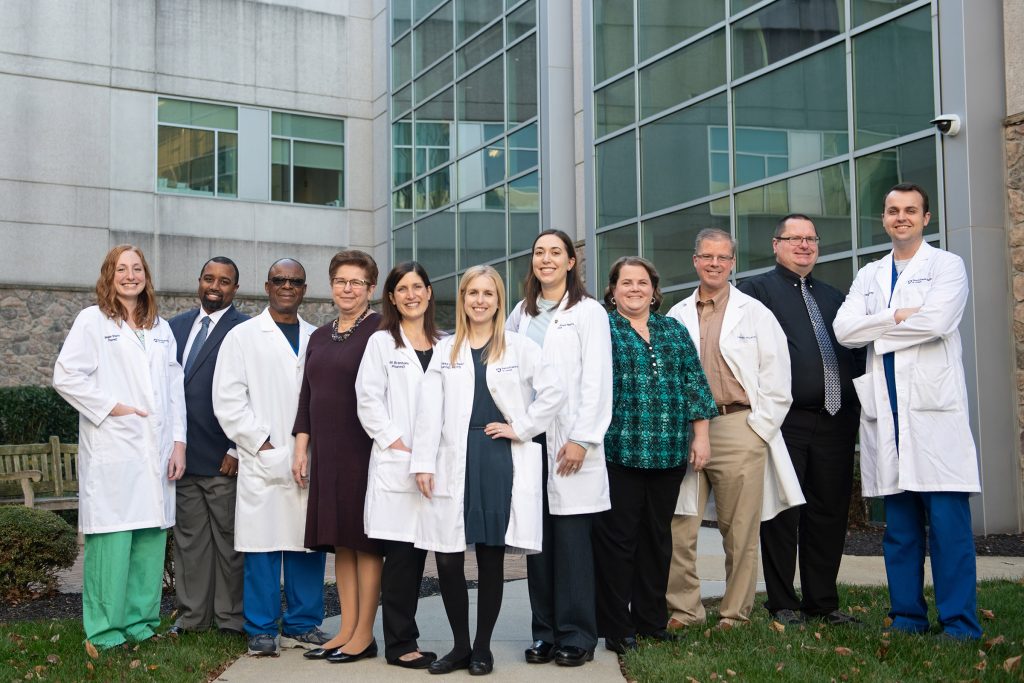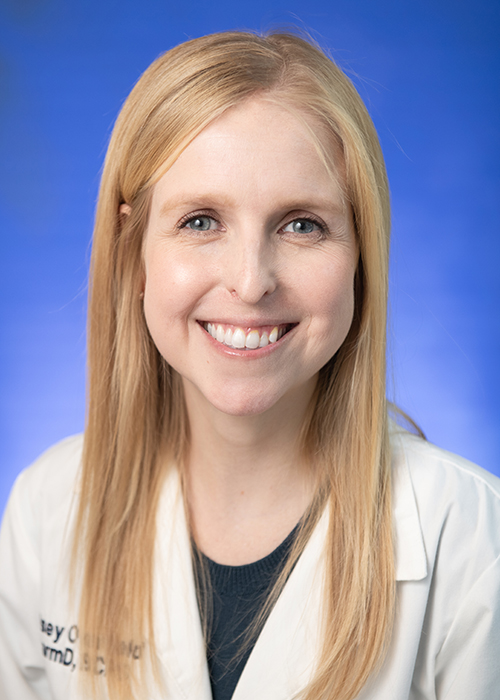Jump to topic
Search
Program Details
The program is designed to train residents to become an independent, patient-focused practitioner, who is able to provide optimal pharmaceutical care in both clinical and operational practice aspects. Residents in this program acquire substantial knowledge required for skillful problem solving, advance their clinical judgment and refine their problem-solving strategies. They develop their leadership skills and strengthen their professional values and attitudes. The program is designed to be flexible. It is adapted to the unique goals, objectives and career plans of each resident so far as the requirements of certification and the residency will permit.
The first residency class graduated in 2010. Since then, the program has been adapting to the valuable feedback provided by our preceptors and past residents and to the ever changing health care environment. Preceptors are highly qualified to provide a rewarding experience. Of the pharmacy preceptors, 80% are board certified and/or are graduates of post-pharmacy school training (i.e., residency, fellowship, etc.).
St. Joseph Medical Center is a community teaching hospital that fosters a strong learning environment. In addition to the pharmacy residency, it is host to a dental residency and family and community medicine residency. The pharmacy department has an intern program comprised of two pharmacy students. Residents have ample opportunities to develop into effective communicators and educators. They participate in ongoing scholarly activities to further develop problem solving skills and improve ability to interpret, generate and disseminate knowledge. They develop and present educational activities for pharmacy personal as well as other members of the health care team. They precept IPPE and APPE students periodically throughout the year from colleges including but not limited to Wilkes University, Temple University and Saint Joseph’s University.
The pharmacy department services an inpatient pharmacy, ambulatory care pharmacy and oncology pharmacy. Inpatient services are offered 24/7 and include medication order verification, disease state medication dosing, clinical monitoring and pharmacy consults and medication reconciliation. The ambulatory pharmacy provides transitions of care services including discharge counseling and meds to beds. The pharmacy includes a state-of-the-art sterile compounding room.
Learn More about the Residency
General Application Information
Interested applicants must register with the American Society of Health-System Pharmacists (ASHP) Residency Matching Program and apply through the Pharmacy Online Residency Centralized Application Service (PhORCAS).
To be considered for the Pharmacy Residency, a PhORCAS application and online application must be completed by early January. Exact deadline each year can be found on the ASHP Residency Directory.
Applicants must:
- Be U.S. citizens
- Have graduated from an ACPE-accredited college of pharmacy
- Be eligible for Pennsylvania licensure (must be licensed by Sept. 30 of the training year)
Applications must include:
- Official transcript
- 3 letters of reference (1 employer, 2 preceptor and/or academic faculty)
- Letter of intent
- Curriculum vitae
Selection Process
The program will consider all complete applications received by the deadline and all applications will be reviewed by the Candidate Selection Committee. The residency program Candidate Selection Committee is comprised of various members with differing views and opinions to promote candidate diversity and ensure no bias in candidate selection for interviews. Candidates chosen for interviews will be contacted as soon as possible to arrange an interview date and time.
Interviews
Interviews are by invitation only, typically conducted mid-January through February. Those invited for an interview will be notified by email. Residents will receive an interview packet including residency program policies. Prior to the interview, candidates are accessed to complete a Situation Judgment Test and are assigned a patient case to present at the time of the interview. Interviewees will be offered a tour of the facilities as well as time with the current residents.

Preceptors with the Pharmacy Residency at Penn State Health St. Joseph Medical Center post for a photo in November 2022.
This table shows where trainees in the Pharmacy Residency have gone after completing the program.
Penn State Health
Penn State Health is a multi-hospital health system serving patients and communities across 29 counties of Pennsylvania. Its mission is to improve health through patient care, research, education and community outreach.
In December 2017, the system partnered with Highmark Health to facilitate creation of a value-based, community care network in the region. The shared goal of Highmark and Penn State Health is to ensure patients in the community are within:
- 10 minutes of a Penn State Health primary care provider
- 20 minutes of Penn State Health specialty care
- 30 minutes of a Penn State Health acute care facility
Learn more about Penn State Health

Penn State Health St. Joseph Medical Center
Penn State Health St. Joseph
2500 Bernville Road, Reading, Pa. 19605 (Bern Township, Berks County)
- A two-campus community medical center in Berks County (southeastern Pennsylvania), with an acute care hospital in Bern Township and a downtown Reading campus
- Approximately 1,800 employees, including 400 board-certified and fellowship-trained physicians in all specialties
- Nationally accredited centers for chest pain, stroke, heart failure and cancer care
- Roughly 47,000 emergency department visits and 7,500 inpatient admissions annually
Institutional Resources
Penn State Health and Penn State College of Medicine celebrate, embrace and support the diversity of all patients, faculty, staff, students and trainees.
Office for Diversity, Equity and Inclusion
In keeping with this, Penn State Health has an active Office for Diversity, Equity and Inclusion with various programs, networks and resource groups, including:
- Talks and lectures on diversity, equity and inclusion through the Inclusion Academy
- Regular events on topics such as eradicating racism and creating a culture of inclusiveness
- Many Business Employee Resource Groups (BERGs), including:
- Disability Business Employee Resource Group
- Interfaith Business Employee Resource Group
- LGBTQ+ Business Employee Resource Group
- Military and Veterans Business Employee Resource Group
- Multicultural Business Employee Resource Group
- NextGen Business Employee Resource Group
Learn more about the Penn State Health Office for Diversity, Equity and Inclusion
Learn more about the College of Medicine’s Office for Diversity, Equity and Belonging
Office for Culturally Responsive Health Care Education
The vision at Penn State College of Medicine and Penn State Health is to equip learners with the knowledge, skills and attitudes they will need to provide culturally excellent health care and research for an increasingly diverse U.S. population. The Office for Culturally Responsive Health Care Education was formed to help meet that goal.
Learn more about the Office for Culturally Responsive Health Care Education
Office for a Respectful Learning Environment
In addition, the institution does not tolerate discrimination, biases, microaggression, harassment or learner mistreatment of any kind, and any concerns are immediately addressed by the Office for a Respectful Learning Environment.
Learn more about the Office for a Respectful Learning Environment
Network of Under-represented Residents and Fellows
The Network of Under-represented Residents and Fellows (NURF) is a group of diverse residents and fellows representing all specialties. NURF’s goal is to promote cultural diversity in the residency programs through community involvement, mentorship with diverse faculty, professional networking and support for the recruitment of diverse medical students into the residency programs.
NURF is sponsored by the Penn State College of Medicine Graduate Medical Education Office and the Penn State Health Office for Diversity, Equity and Inclusion.
General Contact Information
Fax: 610-378-2609
Curriculum Details
The residency year provides a fertile environment for accelerating growth beyond entry-level professional competence through supervised practice under the guidance of model practitioners. The program has established minimum expectations for trainee performance during the residency program; however, trainees will be strongly encouraged to surpass these minimum expectations. Specifically, residents will be required to complete/demonstrate competency in the following:
- 52-week term of appointment
- Completion of all required rotations, longitudinal rotations and one elective
- In collaboration with the health care team, provide safe and effective patient care to a diverse range of patients, including those with multiple co-morbidities, high-risk medication regimens and multiple medications following a consistent patient care process.
- Interact effectively with patients and their caregivers
- Provide effective medication and practice-related education to patients, caregivers, health care professionals, students and the public (individuals and groups).
- Ensure continuity of care during patient transitions between care settings.
- Prepare, dispense and manage medications to support safe and effective drug therapy for patients.
- Demonstrate ability to manage formulary and medication-use processes, as applicable to the organization.
- Demonstrate ability to evaluate and investigate practice, review data and assimilate scientific evidence to improve patient care and/or the medication-use system.
- Demonstrate leadership and management skills.
- Effectively employ appropriate preceptor roles when engaged in teaching students, pharmacy technicians or fellow health care professionals.
- Completion of a research manuscript
- Attendance and poster presentation at ASHP Midyear Clinical Meeting
- Attendance and platform presentation at ASHP Eastern States Conference
Orientation is the resident’s first rotation of the year. This time is devoted to familiarizing the resident to the operations of Penn State Health St. Joseph Medical Center, the pharmacy department and the intricacies of the residency program. Components of orientation will include the organization’s general employee orientation and orientation to the electronic medical record system. It will orient the resident to the intricacies of the residency program including:
- Residency manual
- Residency’s purpose and practice environment
- ASHP PGY-1 accreditation standards, competencies, goals and objectives
- Residency program structure including all program requirements
- Description of required and elective learning experiences
- Evaluation strategy
- Residency policies, terms and conditions
- Training in PharmAcademic
- Sterile fingertip and media fill testing
- Pharmacy department structure and department policies
- All pertinent departmental technology platforms
- Process for reporting issues around harassment and inappropriate behavior
- Strategies for maintaining well-being and resilience (resources will be provided)
The remainder of time will be devoted to familiarizing the resident to the operations of the Pharmacy Department. It will focus on the distribution aspects of pharmacy services along with an overview of how all aspects of pharmacy services intersect. Policies and procedures, including all clinical protocols, will be reviewed during orientation; although, in-depth training on clinical protocols, clinical consults, multidisciplinary rounds and other decentralized pharmacy services will occurring during other rotations throughout the year. Pharmacist and pharmacy resident orientation checklists as well as competencies will be introduced as a means of ensuring a comprehensive training experience to prepare the resident for future learning experiences and staffing responsibilities. Also during the orientation learning experience, the resident will complete an initial self-evaluation and will create an individualized residency development plan for the year.
During the program year, the resident will complete a set of required clinical rotations ranging from four to six weeks long, as well as multiple longitudinal experiences.
The majority of inpatient clinical rotations will take place in the main campus in Bernville, Pa. Depending on the resident’s interests, learning experiences can be arranged at the Downtown Campus in Reading, Pa., which includes outpatient clinics.
Required rotations
- Orientation (four weeks)
- Internal medicine (two rotations of four weeks each)
- Emergency department (five weeks)
- Critical care (eight weeks)
- Infectious disease (six weeks)
- Pharmacy administration (four weeks)
- Medication safety (four weeks)
- Sterile products preparation (four weeks)
Longitudinal experiences
- Patient-centered dispensing
- Drug information
- Research project
- Transitions of care
Elective rotations
- Advanced medication safety (four weeks)
- Oncology (four weeks)
The PGY-1 resident is required to staff the inpatient pharmacy every other weekend and three holidays per year. These requirements are subject to change in order to customize the service learning experience to meet the needs of the resident as determined by the Residency Advisory Committee.
The service rotation and clinical rotations are not to interfere with each other; it is the responsibility of the resident to make arrangements with the appropriate preceptor(s) when a change in the schedule is needed.
The resident will design and complete a research project under the guidance of a project adviser. The project results are to be presented at the Eastern States Residency Conference held in the spring.
Latest News from Penn State Health St. Joseph



